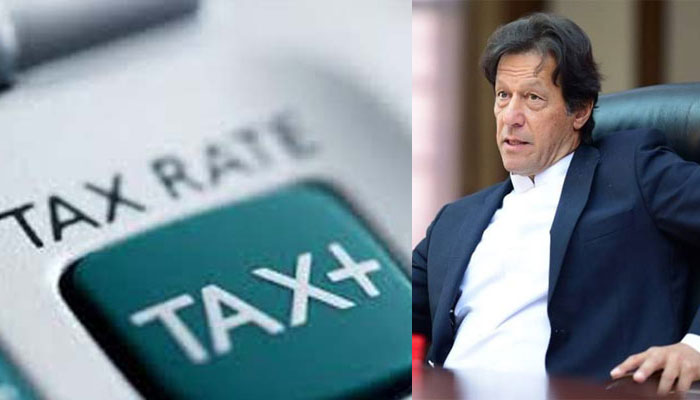Think tank gives 4.2 score to PTI tax reforms
ISLAMABAD: Prime Institute, a private sector think tank, has given only 4.2 score out of 10 to the government tax reforms pursued in last two and half year period.
According to the findings of Prime Institute released on Thursday, the PTI government took charge about two and a half years ago. The current government inherited a system of taxation with multiple loopholes and institutional frictions. The government rightly advocated and later launched tax reforms as per their electoral agenda.
The aim was to increase revenue generation through tax collection to ultimately end dependence on external sources. Tax reforms require long-term orientation to be most effective. This report sets out to evaluate the performance of the incumbent government against their own set targets in the domain of taxation.
The achievement of the government, during the first half of its tenure, across 10 targets is scored. The report gives 42.5 percent score on tax reforms measured against promises. The success of tax reforms is categorised as not achieved, less than partially achieved, partially achieved, and achieved.
The targets of the shift towards direct taxation as the primary source of tax revenue and simplify tax assessment rules for corporations and small businesses fall in the first category as no progress has been made or detected.
The increase in Federal Board of Revenue’s autonomy remains qualified, landing in it less than partially achieved category. Most of the targets – namely incentivise businesses to be part of the formal economy, champion sustainable initiatives to reduce taxes on businesses, improve audits by establishing risk engines and smart algorithms to identify potential taxpayers for audit, improve enforcement, publish names of non-compliant debtors and pursue large tax evaders and crack down corrupt practices that promote tax evasion – indicate partial success.
Lastly, the government's progress across the reduction of the transaction cost of paying taxes is praiseworthy, as this is the only target the incumbent government has achieved. The tax collections have also been analysed in the context of these tax reforms. The tax target was missed in both years – FY19 and FY20. The latter was only met when the target was revised by the Federal Board of Revenue. The tax collection continues to fall short in the first half of FY21. These shortfalls can be attributed to multiple causes, the key ones being: economic recession, import compression, and reduced demand in the petroleum and auto-sector.
The need of the hour is to broaden Pakistan’s tax base, reduce reliance on indirect taxation, and provision of a simple and fair tax system that is complemented by an efficient and competent administration. As per the analyses, the incremental reforms have not succeeded in the efficient transformation of the tax structure. Therefore, the way forward appears to be a radical restructuring of the taxation system.
-
 Michelle Obama Gets Candid About Spontaneous Decision At Piercings Tattoo
Michelle Obama Gets Candid About Spontaneous Decision At Piercings Tattoo -
 Bunnie Xo Shares Raw Confession After Year-long IVF Struggle
Bunnie Xo Shares Raw Confession After Year-long IVF Struggle -
 Brooks Nader Reveals Why She Quit Fillers After Years
Brooks Nader Reveals Why She Quit Fillers After Years -
 Travis Kelce Plays Key Role In Taylor Swift's 'Opalite' Remix
Travis Kelce Plays Key Role In Taylor Swift's 'Opalite' Remix -
 How Jennifer Aniston's 57th Birthday Went With Boyfriend Jim Curtis
How Jennifer Aniston's 57th Birthday Went With Boyfriend Jim Curtis -
 JoJo Siwa Shares Inspiring Words With Young Changemakers
JoJo Siwa Shares Inspiring Words With Young Changemakers -
 James Van Der Beek Loved Ones Breaks Silence After Fundraiser Hits $2.2M
James Van Der Beek Loved Ones Breaks Silence After Fundraiser Hits $2.2M -
 Disney’s $336m 'Snow White' Remake Ends With $170m Box Office Loss: Report
Disney’s $336m 'Snow White' Remake Ends With $170m Box Office Loss: Report -
 Travis Kelce's Mom Donna Kelce Breaks Silence On His Retirement Plans
Travis Kelce's Mom Donna Kelce Breaks Silence On His Retirement Plans -
 Premiere Date Of 'Spider-Noir' Featuring Nicolas Cage Announced
Premiere Date Of 'Spider-Noir' Featuring Nicolas Cage Announced -
 Pedro Pascal's Sister Reveals His Reaction To Her 'The Beauty' Role
Pedro Pascal's Sister Reveals His Reaction To Her 'The Beauty' Role -
 Kate Middleton Proves She's True 'children's Princess' With THIS Move
Kate Middleton Proves She's True 'children's Princess' With THIS Move -
 Paul Anka Reveals How He Raised Son Ethan Differently From His Daughters
Paul Anka Reveals How He Raised Son Ethan Differently From His Daughters -
 'A Very Special Visitor' Meets Queen Camilla At Clarence House
'A Very Special Visitor' Meets Queen Camilla At Clarence House -
 Jodie Turner Smith Shares One Strict Rule She Follows As A Mom
Jodie Turner Smith Shares One Strict Rule She Follows As A Mom -
 Hailey Bieber Reveals KEY To Balancing Motherhood With Career
Hailey Bieber Reveals KEY To Balancing Motherhood With Career




